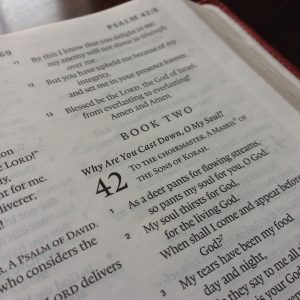My last five posts have attempted to answer three questions: (1) “Should we preach Christ in every sermon?“; (2) “Why should we preach Christ in every sermon?“; and (3) “How should we preach Christ in every sermon?” I have attempted to illustrate (3) with a Proverb, a law, and an historical narrative. Now, I hope to show how to preach Christ from Psalm 42:1-11:
“For the choir director. A Maskil of the sons of Korah. As the deer pants for the water brooks, So my soul pants for You, O God. My soul thirsts for God, for the living God; When shall I come and appear before God? My tears have been my food day and night, While they say to me all day long, “Where is your God?” These things I remember and I pour out my soul within me. For I used to go along with the throng and lead them in procession to the house of God, With the voice of joy and thanksgiving, a multitude keeping festival. Why are you in despair, O my soul? And why have you become disturbed within me? Hope in God, for I shall again praise Him For the help of His presence. O my God, my soul is in despair within me; Therefore I remember You from the land of the Jordan And the peaks of Hermon, from Mount Mizar. Deep calls to deep at the sound of Your waterfalls; All Your breakers and Your waves have rolled over me. The LORD will command His lovingkindness in the daytime; And His song will be with me in the night, A prayer to the God of my life. I will say to God my rock, “Why have You forgotten me? Why do I go mourning because of the oppression of the enemy?” As a shattering of my bones, my adversaries revile me, While they say to me all day long, “Where is your God?” Why are you in despair, O my soul? And why have you become disturbed within me? Hope in God, for I shall yet praise Him, The help of my countenance and my God.”
The Psalms present a challenge to the preacher to be true to the text, the redemptive-historical context, and the analogy of faith. However, because we know the covenantal, law-gospel, justification-sanctification theology of all the Scriptures, we can justly preach Christ in all the Scriptures. Each sermon must have enough of the gospel to save the sinner and to edify the saint through the preaching of Jesus Christ Himself.

Grammatical – This Psalm is a maschil, an instructive ode. It is constructed in two parts, each beginning at Psalm 42:1 and 42:6, both followed by the same refrain. Its title attributes its composition to the sons of Korah, the keepers of the gates to the tabernacle, but many attribute it to David himself. There is no sure quotation from this Psalm in the New Testament.
Historical – Amidst many possibilities, Keil and Delitzsch believe the author to be a Korahitic Levite who is with David in exile beyond the Jordan because of the rebellion of Absalom. It echoes the same sentiments that David expressed in other Psalms (Psa 3; 63) yet stands as a separate author. Under the Sinai covenant, he finds himself at a distance from the temple which the sons of Korah loved (Psa 84) and surrounded by enemies who mock his God. He remembers the processions to the temple he participated in and weeps to join them again. He feels God’s providence overwhelming as water overwhelms the falls somewhere beyond the Jordan in exile. He responds with temptation to despair in his soul, yet he repeatedly preaches to himself to hope in God alone. Under the Sinai covenant, the tabernacle was the only authorized place on earth for God to be worshipped fully according to His instructions. The Holy of Holies was effectively the throne and presence of God on earth, the very mercy seat of God. Even though the man of faith could pray at all places and times, to be separated from the tabernacle was to feel incomplete in worship. He longs to return to the tabernacle where God dwells on earth yet wrestles with faith that God will return him. So, he preaches to His soul God’s faithfulness to deal with his thirst and despair. The end of the story is that God returned David and the sons of Korah to Jerusalem. God answered the Psalmist’s cry.
Theological – Knowing God’s overall plan in the covenant of grace to keep David as king and to bring Christ born in Bethlehem, we see the struggle of an OT believer waiting for that which is perfect to come. His experience before the new covenant is real yet tied to the tabernacle in such a way that he feels incomplete away from its presence. And not only that, the confusion of God’s enemies triumphing over David tested his faith in the covenant promises to David. His tears and mournings are real under the Sinai covenant.
In light of all these things, the Bible student will study the whole counsel of God, the analogy of faith, and to preach this Psalm in its context, while applying it to today’s hearers. In doing so, under the new covenant, we find that our Lord removed the earthly temple as the official dwelling place of God on earth, giving a spiritual worship of God at every place in spirit and truth (Jn 4:21-24). No longer does the pageantry, the priesthood, the sacrifices and the Holy of Holies locate the primary presence of God to the believer. Distance from a tabernacle no longer interferes with the consciousness of true worship. Yet, even this spiritual worship does not remove the times of opposition from enemies who mock the faith of the believer. Paul’s litany of soul struggles with the world and providence parallel the cries of the Psalmist (2 Cor 4:8-10). Even further, our Lord cried out to God with loud crying and tears at the oppression of the enemy and wrestling with the providential will of God, both in the garden and upon the cross (Heb 5:7-8). He was tempted in every point as was the Psalmist, even as we are, yet without sin, in his tears and mournings. Therefore he is able to come to the aid of those who are tempted to despair and mourning (Heb 4:15-16). He brings the place and experience of worship to them wherever they are on earth, lesson which the Hebrews’ church had forgotten. This calls us to preach the same message which the Psalmist preached to himself: “Hope alone in God alone.” Even yet we await the perfect worship in our heavenly place, sometimes with tears which one day will be wiped away.
Suggestions for preaching Christ in this Psalm:
- Consider the wrestlings of the OT believer with worship and providence which Christians may experience.
- Understand the greater worship and knowledge of God’s providence for the NT believer through Christ’s comin
- Believe in the soul-trials of Jesus Christ and His great salvation to overcome the temptations to despair, tears, and mourning in this world.
If we believe that our Lord was tempted in every point as we are, yet without sin, then we can preach the soul-life of the Psalms in their context yet show how our Lord went through all trials to accomplish our salvation and bring us to the heavenly tabernacle. We must put down despair of all kinds and preach to ourselves to hope in God in Christ. Hebrews 12:22-24 says:
“But you have come to Mount Zion and to the city of the living God, the heavenly Jerusalem, and to myriads of angels, to the general assembly and church of the firstborn who are enrolled in heaven, and to God, the Judge of all, and to the spirits of the righteous made perfect, and to Jesus, the mediator of a new covenant, and to the sprinkled blood, which speaks better than the blood of Abel.”
There is no reason for the Christian to live in despair as did the Psalmist. God has proven His faithfulness, in which the Psalmist hoped, in the glorious coming of our Lord Jesus Christ. He Himself experienced as a man the trials of living in this world and can comfort us as our Great High Priest. Now we hope in God with greater assurance of that glory which is to come. This is how we should preach Christ in the Psalms.











 “For the choir director. A Maskil of the sons of Korah. As the deer pants for the water brooks, So my soul pants for You, O God. My soul thirsts for God, for the living God; When shall I come and appear before God? My tears have been my food day and night, While they say to me all day long, “Where is your God?” These things I remember and I pour out my soul within me. For I used to go along with the throng and lead them in procession to the house of God, With the voice of joy and thanksgiving, a multitude keeping festival. Why are you in despair, O my soul? And why have you become disturbed within me? Hope in God, for I shall again praise Him For the help of His presence. O my God, my soul is in despair within me; Therefore I remember You from the land of the Jordan And the peaks of Hermon, from Mount Mizar. Deep calls to deep at the sound of Your waterfalls; All Your breakers and Your waves have rolled over me. The LORD will command His lovingkindness in the daytime; And His song will be with me in the night, A prayer to the God of my life. I will say to God my rock, “Why have You forgotten me? Why do I go mourning because of the oppression of the enemy?” As a shattering of my bones, my adversaries revile me, While they say to me all day long, “Where is your God?” Why are you in despair, O my soul? And why have you become disturbed within me? Hope in God, for I shall yet praise Him, The help of my countenance and my God.”
“For the choir director. A Maskil of the sons of Korah. As the deer pants for the water brooks, So my soul pants for You, O God. My soul thirsts for God, for the living God; When shall I come and appear before God? My tears have been my food day and night, While they say to me all day long, “Where is your God?” These things I remember and I pour out my soul within me. For I used to go along with the throng and lead them in procession to the house of God, With the voice of joy and thanksgiving, a multitude keeping festival. Why are you in despair, O my soul? And why have you become disturbed within me? Hope in God, for I shall again praise Him For the help of His presence. O my God, my soul is in despair within me; Therefore I remember You from the land of the Jordan And the peaks of Hermon, from Mount Mizar. Deep calls to deep at the sound of Your waterfalls; All Your breakers and Your waves have rolled over me. The LORD will command His lovingkindness in the daytime; And His song will be with me in the night, A prayer to the God of my life. I will say to God my rock, “Why have You forgotten me? Why do I go mourning because of the oppression of the enemy?” As a shattering of my bones, my adversaries revile me, While they say to me all day long, “Where is your God?” Why are you in despair, O my soul? And why have you become disturbed within me? Hope in God, for I shall yet praise Him, The help of my countenance and my God.”










